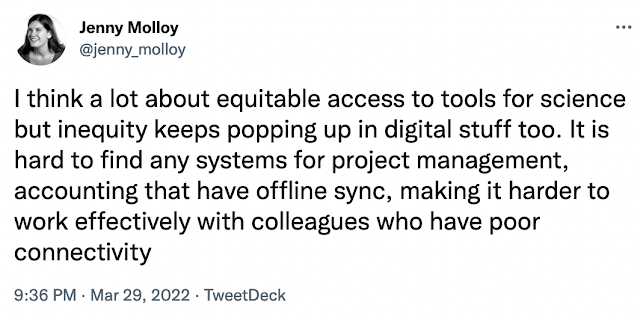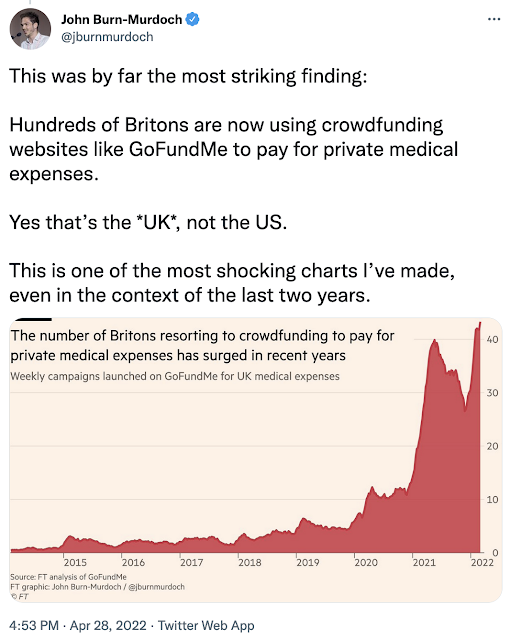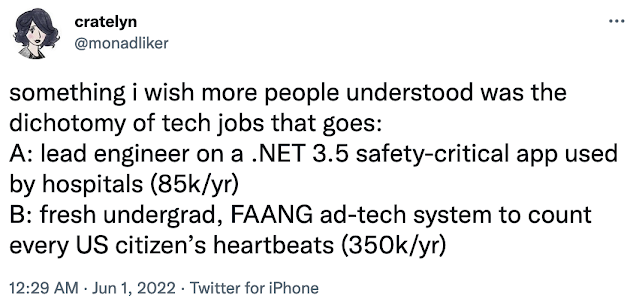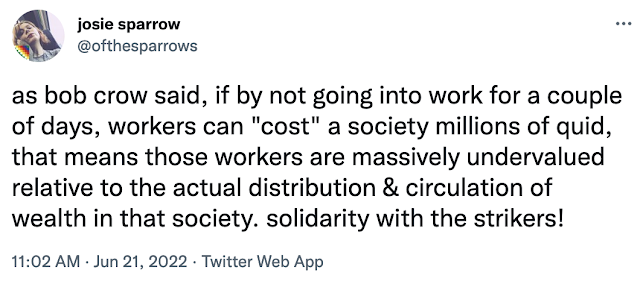Notes: projects, tech, soil, water
It's always satisfying when projects you have been involved with demonstrate great results:
 |
| https://twitter.com/ResearchEssex/status/1504867213840420870 |
Cofarm is in our third growing season, and starting to think about how best to grow - we're getting quite a lot of interest from people interested in creating Cofarms locally. The tricky bit as usual is having the time (or money) to properly plan how to scale up, and to support potential new sites, and writing up the playbook.
Now Play This 2022 was a lovely hybrid festival of experimental game design exploring play and democracy, and much of it is now on YouTube. If you missed earlier editions, such as 2021's climate-themed festival, you can catch up on those too.
 | |
| https://twitter.com/chris_m_h/status/1504533322986369030 |
Working at Field Ready I learned how not all 'maker' (or humanitarian) interventions are helpful - something is not always better than nothing. I was reminded of this by Tarek Loubani's article about the importance of using suitable tourniquet designs. From his work with Glia in Gaza, there are well tested open hardware designs out there, so folks responding to the crisis in Ukraine don't need to reinvent the wheel.
 |
| https://twitter.com/jenny_molloy/status/1508905873615331340 |
The FT[paywall] notes that social support increasingly depends on charities, who depend on donations (falling) and volunteers (mostly available in already comparatively well off areas).
 |
| https://twitter.com/jburnmurdoch/status/1519706457037586435 |
The Royal Academy of Engineering published a report into how to improve buildings for health. Ventilation is important. Cath Noakes's Twitter thread summarises the key points.
The impact of Parliamentary time and process on policy-making, from James Plunkett.
The web is not what it used to be:
 |
| https://twitter.com/CatalinaGoanta/status/1545753762341552128 |
And so here we are:
 |
| https://twitter.com/ilumium/status/1511260390285524993 |
Useful article from Careful Industries about ways to talk about power and digital - here's the summary:
 |
| https://medium.com/careful-industries/a-digital-power-glossary-9c7635dd586f |
An interview with Carolyn Chen about her new book, Work Pray Code - about tech companies and spirituality, via Adrian Hon. Maybe it helps with knowledge worker productivity? but -
I talked about in the book how the workplace acts as this giant magnet that attracts the time, energy and devotion of a community. But what happens to other institutions? What happens to the family, to faith communities, to schools, even small businesses, arts organisations, neighbourhood associations? In the American model, we see these civic institutions as fundamentally important to preserving our democracy. All these other institutions start to grow smaller and smaller, because you have this alpha institution that’s attracting everything.
Hmm. I was lightly intrigued by a16z's move to investing in a decentralised open source, community owned metaverse - especially when I saw this tweet with the aspirations set out:
 |
| https://twitter.com/antonyslumbers/status/1530096866284691457 |
I've not seen any explanations yet for this. Venture capital is going to follow their favourite flavour of hype, anyway -
 |
| https://twitter.com/dhofstetter_x/status/1536295389615251456 |
What should ride/drive where? This Streetsblog USA article dives into the electric/pedalled/scooter/bike/whatever world (HT Trucks newsletter).
Regrettably accurate:
 |
| https://twitter.com/monadliker/status/1531779960590958592 |
A thread about the 2013 Metcalf Power substation attack - a very strange incident you've probably not heard of, in which an competent group shot up an electricity substation for no known reason.
This is what supply chain problems look like:
 |
| https://twitter.com/happyvalleyset/status/1519322413292560389 |
 |
| https://twitter.com/edent/status/1532069611251720193 |
An unusual idea from Stephen Hall about how to get people excited about energy retrofits and new financing models [thread].
Two lovely articles found via Sentiers. First, Clare Evans on how the internet is like a forest:
The wood wide web is ancient, but it’s new to us. We owe much of our knowledge to Suzanne Simard, a Canadian ecologist who has spent her career revealing the cooperative nature of forests. In field experiments beginning in the 1980s, Simard traced the ways roots and symbiotic mycorrhizal fungi commingled beneath the surface of the soil in the old-growth forests of British Columbia. Enmeshed in a fungal embrace, she discovered, trees communicate, sending chemical warning signals to one another and passing sugar, water, carbon, nitrogen, and phosphorus between species. Wild forests operate, Simard wrote, as “an intelligent system, perceptive and responsive.”
Nature gave Simard’s research front cover-treatment in August 1997; it’s the journal’s editors who, inspired by the development of the World Wide Web, dubbed her discovery the “wood wide web.”
... The web isn’t what it used to be. When the editors of Nature compared mycorrhizal fungi to a computer network, the web was still predominantly peer-to-peer, its users sharing their thoughts on personal home pages and homespun message-boards. Online advertising was in its infancy. But as the web has centralized, it has strayed further and further from the ideal presented by the wood wide web.
... The wood wide web has been a powerhouse metaphor for popularizing the mutualistic relationships of healthy forests. But like a struggling forest, the web is no longer healthy. It has been wounded and depleted in the pursuit of profit. Going online today is not an invigorating walk through a green woodland—it’s rush-hour traffic alongside a freeway median of diseased trees, littered with the detritus of late capitalism.
... Tech and social media giants have clear-cut the web, privileging high-value crops—viral content, controversy, and clickbait—over a healthier ecosystem of people, opinions, and perspectives.
And secondly, an interview looking at a new, and very different, metaphor for data: data as the new soil. Most of these quotes are from Jerry Michalski:
The Wood Wide Web, sustainable agriculture, etc. In healthy agriculture, if you focus on soil health, a lot of the other elements of the ecosystem actually work because you will make choices for the system around all the different systems--the water system and so forth--that lead to soil fertility.
... There are two dramatically different ways of looking at this one. One is how do we prevent bad actors from using our data in bad ways? Which means how do we prevent the data from leaking? How do we lock down the data? The other side is, if we actually thought of a data layer as healthy soil, what are all the positive things that would lead to the goal of preventing damage? Unfortunately, trying to prevent leakage or misuse cripples our ability to even spend time thinking about the upsides.
... I'm really most interested in what it could mean if I save an insight out into this world, in some virtual space above Wikipedia and The Google, in some scaffolding where it's findable by other people who I trust or don't trust, who might then compare notes with me so we might then build up some ideas that lead to policy platforms that are well articulated and include evidence?
Why can't we share what we know on this larger scale? And wouldn't that be really interesting as a new form of soil? When you plow healthy soil, you tear it up, you kill all the little critters that are in the soil, you tear up the root systems, you destroy a lot of the health of soil merely by tilling. So one of the things in soil fertility is: don't turn over the damned soil. Another one is: keep it protected so the water doesn't evaporate. So, always have a cover crop or something on top of the soil. Since there are a bunch of simple rules about protecting soil, what's the equivalent here? And then how do we actually start building a place where we can share what we know with trusted people and then compare notes with untrusted people? I think that's really exciting territory.
Micah Sifry: Yes, that is a perfect segue to part two of this conversation, which is your thinking about the “betterverse.” Instead of the metaverse as being envisioned and constructed by people like Mark Zuckerberg as a place for watching movies together and buying digital trinkets. The betterverse would be some kind of layer or protocol that enables people sharing their knowledge with others in ways that accrete up to collective knowledge.
... So, for me, this betterverse idea is the place where we can conduct some of these conversations, share research, share big questions, collect up into smaller communities of high trust and move these ideas forward, which then might attract other people to say, “Oh, wow, those Game B people. They've done a lot of good work on these topics over here. They speak for me. (Or Project Drawdown, or Doughnut Economics, or...) Right? And then by the way, you can easily imagine a representative from Game B going to government officials and saying, “these 626,234 people will vote exactly as I'm telling you right now.” We’ll shift from lobbying to the distributed, slow building of credibility as we actually work to improve society together.
... If this Betterverse of discussing actual issues that matter works, it trickles back up into journalism, science, education, governance, and elections, because then people in each of these fields are motivated to figure out how to show their work, how to solve things together. So there's an opportunity here to actually dramatically change how media works and how each of these institutions function.
 |
| https://twitter.com/AlexSteffen/status/1544064741441617920 |
Sir James Bevan, Environment Agency Chief Executive, said:
"The biodiversity crisis joins the climate crisis as an existential risk to our survival, but as this report sets out the solution is not to retreat but to work together to build a nature-positive response.
Nature provides the basics for life - clean water, clean air and food. With major pressures on land use across England, nature-based solutions must be a major part in our response to protect these essentials whilst rebuilding our natural world."
England is one of the most nature-depleted countries in the world due to its long history of industrialisation and land use changes over millennia. Large areas of habitats have been lost with 99.7% of fens, 97% of species-rich grasslands, 80% of lowland heathlands, up to 70% of ancient woodlands and up to 85% of saltmarshes destroyed or degraded.
The impacts on species have also been severe, with a quarter of mammals in England and almost a fifth of UK plants threatened with extinction.
Agroecology is part of the way forward.
The Environment Agency does not mince its words in this report on environmental performance of water and sewerage companies in England (highlights mine):
In 2021, the environmental performance of England’s 9 water and sewerage companies was the worst we have seen for years. Measured against our four-star rating, most of them went the wrong way: down. Four companies (Anglian, Thames, Wessex, Yorkshire Water) were rated only 2 stars, which means they require significant improvement. Two (Southern and South West Water) fell to 1 star, the bottom of our star ratings, meaning their performance was terrible across the board.
The sector’s performance on pollution was shocking, much worse than previous years. Serious pollution incidents increased to 62, the highest total since 2013. There were 8 of the most serious (category 1) incidents, compared with 3 in 2020 and most companies, 7 of the 9, were responsible for an increase in serious incidents compared to 2020.
Company directors let this occur and it is simply unacceptable. Over the years the public have seen water company executives and investors rewarded handsomely while the environment pays the price. The water companies are behaving like this for a simple reason: because they can. We intend to make it too painful for them to continue as they are.
Since 2015 the Environment Agency’s prosecutions against water companies have secured fines of over £138 million. We are increasing inspections of sewage treatment works; insisting that the companies put monitors on all their storm overflows, both on the network and at sewage treatment works and make the data public; and we have also begun the country’s largest ever investigation into environmental crime, involving all the companies, where we are looking at whether they have knowingly and deliberately broken the law in relation to the treatment and discharge of sewage.
But this is not enough. The water companies will only stop behaving like this if they are forced to. The amount a company can be fined for environmental crimes is unlimited, but fines currently handed down by the courts often amount to less than a Chief Executive’s salary. We need courts to impose much higher fines for serious and deliberate pollution incidents. The threat of significant impending financial penalties has an impact. Investors should no longer see England’s water monopolies as a one-way bet.
Repeat offenders can now expect criminal prosecutions for less serious environmental incidents where once the Environment Agency would have used civil powers. We would like to see prison sentences for Chief Executives and Board members whose companies are responsible for the most serious incidents. We would also like to see company directors being struck off so they cannot simply delete illegal environmental damage from their CV and move on to their next role.
 |
| https://twitter.com/thomasforth/status/1538281395730145280 |
 |
| https://twitter.com/ofthesparrows/status/1539187047100993537 |
Our food system was broken even before the Ukraine war, Covid and Brexit, with every penny extracted and exploitation by supermarkets and chain restaurants, notes Tim Hayward (thread).
 |
| https://twitter.com/_ryanruby_/status/1518568144297672704 |